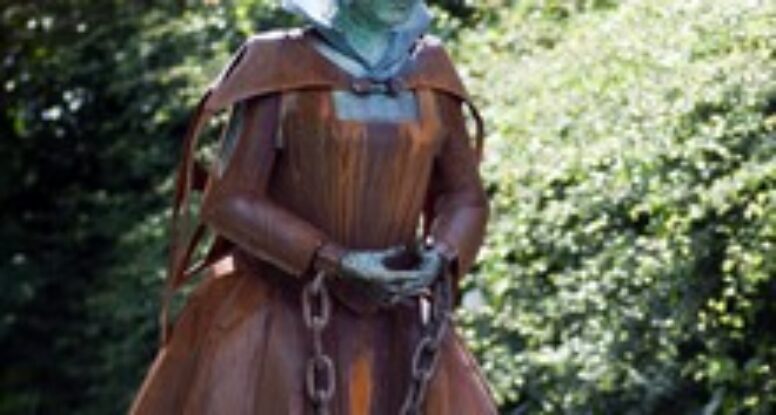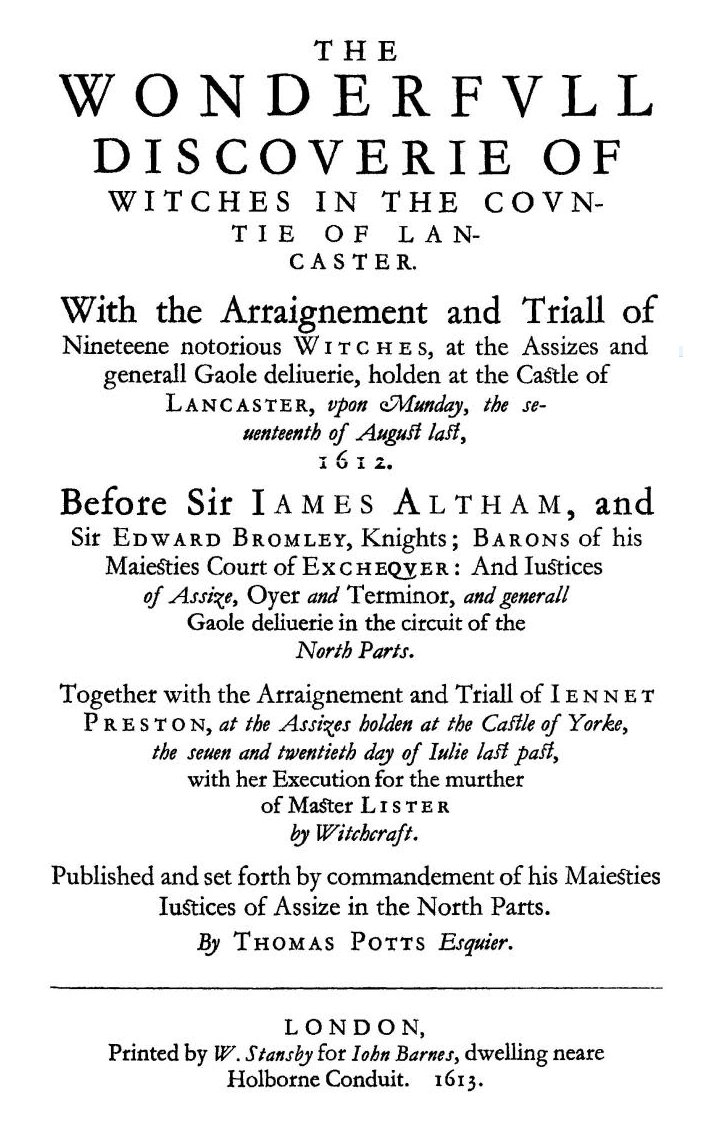
The Sad and Accurate History of Alice Nutter, Catholic
Many of you have, of late, been enjoying the video adaptation of Neil Gaiman’s and Terry Pratchett’s Good Omens: The Nice and Accurate Prophecies of Agnes Nutter, Witch — as well you should, it’s quite an enjoyable romp with wonderful performances by stars Michael Sheen, David Tennant, and Adria Arjona (among others).
What you might not know however (though the authors certainly did) is the link between the fanciful Agnes Nutter and the real life witch trials of 16th century Lancashire, in particular the Pendle Witch trials, which echo damningly even today.
This was a generation after the reformation, and England was ruled by the young James the First, who during his upbringing had been indoctrinated (brainwashed, actually) against the Catholics with wild stories of witchcraft and demons. Indeed, James may be the only monarch to have written a book on Demonology, the at the time popular Daemonologie in which among other things, he made clear two things, A) that witchcraft (as understood at the time) was high treason, both against the crown and God, and B) that in matters of treason, even the testimony of children should be admissible in court. To those living today who long for other than conventional political ideas, be very careful what you wish for.
The Pendle trials occured in the wake of the Gunpower plot, when Guy Fawke’s accomplices were still on the loose, when attempts had been made on the lives of James and his family. He was justifiably paranoid, but it was far easier to blame Satan than to find real opponents who didn’t want to be found, especially for a man taught since childhood that they were one and the same. So…James created something of a “witchfinder army” really a collection of magistrates and investigators seeking to advance their careers by delivering the sought after witches to the gallows. They weren’t entirely mercenary either. This was a century before the discovery of oxygen, two centuries before the germ theory of disease. People really believed in witches, because they had no effing idea how the world worked.
So, when one Alizon Device chanced to witness a passing beggar, John Law, collapse from a stroke moments after she’d cursed him for refusing her money, she naturally thought she was the cause. After all, her mother and grandmother were both “cunning women,” a period term for women who made a living through healing, begging, and extortion–in other words, witches. From contemporary accounts, it’s clear that Law had suffered a stroke, no doubt brought on by exertion and agitation, but young Alizon, convinced that her curse had done him in, attended his bedside to beg his forgiveness. The fact that none of the other curses she doubtless gave on a daily basis in her habit of local begging didn’t enter into it. Then, as now, simple logic was not something children were regularly taught.
The die was cast.
At the time, failure to attend church and take communion was a crime–one enforced at the convenience of the authorities–and Witchfinder Gerneral (actually, Justice of the Peace) Roger Nowell had recently been directed by his government to compile a list of recusants in the area. His investigation of the supposed “curse” uncovered a “party” held by Alizon’s mother, Elizabeth Device, on Good Friday, attended by numerous other supposed “cunning women”, who dined on a stolen sheep. No longer a mere reported curse, this was obviously a conspiracy of Satanic influence and a threat to the king–and more importantly–a career opportunity.
Alice Nutter, a wealthy widow from the area, was accused of having attended the party by nine-year old Jennet along with several others who were also arrested. In exchange for this fingering, Jennet was not arrested with the rest of her family, neighbors and those implicated by others of the accused. The arrested were imprisoned under horrible conditions to await trial, during which incarceration little Alizon and Jennet’s gra ndmother died. Jennet however, was not arrested, and it’s believed she was kept by Roger Nowell until the trial, because naturally the chief prosecutor had no conflict of interest at all in acting as caregiver for his nine-year old star witness.
ndmother died. Jennet however, was not arrested, and it’s believed she was kept by Roger Nowell until the trial, because naturally the chief prosecutor had no conflict of interest at all in acting as caregiver for his nine-year old star witness.
At trial, Jennet was placed up on a table where she implicated everyone in her family, recalling damning conversations between her mother and her familiar (a dog) and reciting spells she had heard cast which, to modern ears, are obvious admixtures of scripture, prayer, and nursury rhymes of the time. But, with other accusations and evidence (all utterly spurious by modern standards) they were enough. A dozen people (mostly women) has been arrested essentially for nothing. One (Jennet’s grandmother) had died in prison. Of the eleven who went to trial (nine women and two men) ten were found guilty and executed by hanging.
As for Alice Nutter, whose family still lives in the district and who gave her name to the character in “Good Omens,” she was merely a widow, both wealthy and educated. It’s most unlikely she was actually at the supposed “party,” but whether young Jennet accused her our of spite, familiarity, or in a failed attempt to lend respectability, we cannot know. Regardless, Alice was largely silent throughout the trial. She had no lawyer, no defense, and no opportunity to call witness. Nor would she have, for she was likely a Catholic, was likely at a Catholic service on the ill-fated day of the Good Friday “party” and may very well have gone to the gallows in silence rather than reveal the existence of her congregation and bring down upon them the King’s “witchfinder army.” Not so cute and funny now, is it?
There was no outrage at these event. Indeed, we know so much about these trials because they were chronicled by one Thomas Potts, the clerk to the Lancaster Assizes, and published successfully as The Wonderfull Discoverie of Witches in the Countie of Lancaster.
Enjoy the show, it’s a good one. But let it serve as a good natured reminder of what can and does happen when bigotry and political ambition are not tempered by law and evidence and reason. The famed witch trials are long over, but the conditions that brought them fester on, and as long as that’s so, we are none of us any safer than poor Alice Nutter, widow and alleged witch, may she rest in peace.
